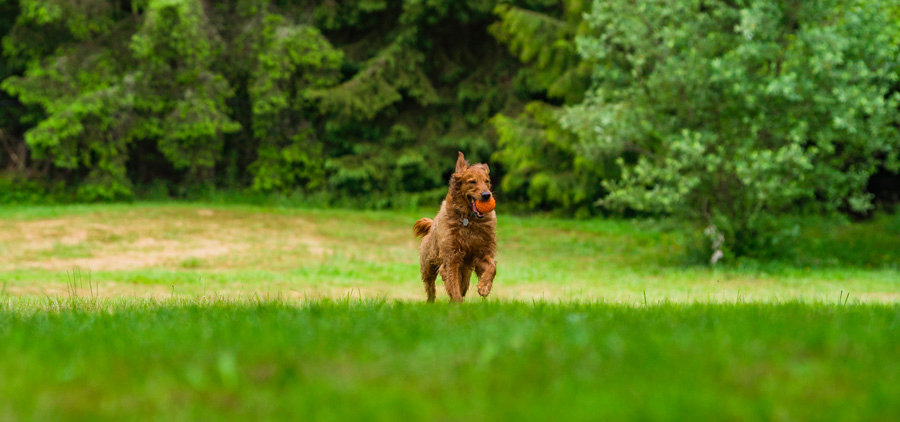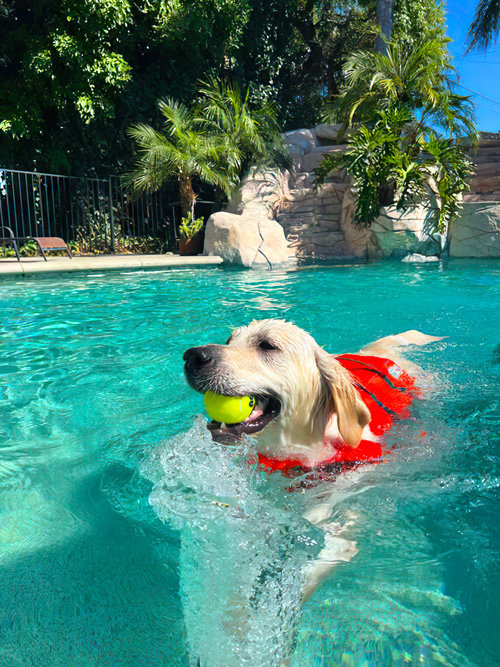Dog-Friendly National Parks: The Ultimate Guide

Want to explore America's stunning national parks with your furry best friend? Finding truly dog-friendly national parks can be tricky. This guide makes it easy. We'll cover the essential rules and regulations for dogs in national parks, plus share tips for a smooth trip. Get ready to discover the most welcoming dog-friendly national parks the US has to offer!
Due to sensitive ecosystems, though, many national parks aren’t very dog friendly. Most NPS locations allow pets only in parking lots, developed campgrounds, and paved viewpoints. These regulations restrict their presence on hiking trails.
This comes as a disappointment to many dog lovers looking to travel with their pups. Don’t worry: A few national parks welcome furry friends with open arms! Here’s what to know about visiting one of America’s protected public spaces with your dog in tow.
Disclaimer: National park rules might change unexpectedly. The below information has been fact checked at the time of writing. If you’re planning a trip with your canine companion, we recommend reading official NPS regulations on the nps.gov website before you go.
Know Before You Go: National Park Checklist for Your Dog
Key Takeaways
- Research before you go: Understanding park-specific pet policies, trail conditions, and potential hazards ensures a safe and enjoyable visit for both you and your dog.
- Pack smart for your pup: Bring essentials like water, a leash, waste bags, and a first-aid kit to keep your dog comfortable and prepared for any situation.
- Consider all your options: If your desired national park has limited dog access, explore nearby national forests or Sniffspot's private dog parks for more off-leash opportunities.
What to bring with you to a dog-friendly national park
Here are a few things to bring with you when visiting any national (or state) park in the United States.
Always pack dog waste bags
Keep your parks clean! Our national parks are incredible public resources—it’s our duty to preserve them for future generations.
Always pack a few extra poop bags in case you need to pick up after your pup. Consider scooping any left-behind piles you come across, too. This will make the environment safer for everyone who visits. Prompt cleanup prevents water pollution, slows the spread of parasites, and encourages parks to keep allowing pets. (When too many dog parents break the rules, government organizations feel pressure to add more restrictions to keep areas clean.)
Bring fresh drinking water
Some national parks offer water fountains for you to fill up bottles and bowls, but it’s a good idea to pack some of your own just in case. Never leave your dog’s hydration (or your own) up to chance—especially on hot days.
A good rule of thumb is that you should have one gallon of water per person or pet per day.
Make sure your dog is wearing a collar or harness with ID tags
Bring a well-fitted collar or harness along with your dog’s identification tags. Your pup will be required to wear this at all times while visiting a national park.
Keep your pup on a secure leash
Along with a collar or harness, bring a leash. Leash laws in national parks are important to protect sensitive terrain, endangered wildlife, and other visitors. There are no national parks in the United States that allow dogs off leash in any area.
(The only exception here: Under the Americans with Disabilities Act, task-trained service dogs are allowed to work off leash if a leash would directly interfere with their ability to perform their job. Outside of that specific situation? Your pup needs to be tethered while in any NPS environment!)

Pack a dog first-aid kit
Accidents happen, especially when we’re out adventuring in the great outdoors. Be prepared for anything by packing a dog first-aid kit. This should include essentials like antiseptic wipes, gauze, and a pet-safe pain reliever. Check the expiration dates on any medications before you leave, and familiarize yourself with how to use everything in the kit. A well-stocked first-aid kit can provide much-needed relief and prevent minor injuries from becoming major problems.
You can buy pre-made first-aid kits from many pet stores or assemble your own. It’s also a good idea to bring a physical copy of your dog’s vaccination records and any other important medical information. Having this information readily available can be invaluable in case of an emergency.
Bring your dog's favorite toys and treats
Keep your dog entertained and engaged by bringing a few familiar toys and a supply of tasty treats. This can help prevent boredom and destructive behaviors, especially if you plan to spend a lot of time in the car or at your campsite. High-value treats can also be useful for training and positive reinforcement, making your trip more enjoyable for both of you. Providing mental stimulation for your dog can make a big difference in their overall happiness on the trip.
Remember to be mindful of wildlife and other park visitors. Store food (human and dog food) properly to avoid attracting unwanted critters. Clean up after your dog and keep them from approaching or interacting with wild animals. Respecting park regulations and other visitors ensures a positive experience for everyone.
Consider a dog carrier or backpack for smaller dogs
If you have a small dog, a carrier or backpack can be a lifesaver, especially on longer hikes or in crowded areas. It can also be helpful if your dog gets tired or injured and needs a break from walking. Look for a carrier or backpack that is well-ventilated, comfortable, and secure. This allows your smaller companion to participate in adventures they might not otherwise be able to handle.
If you’re looking for more unrestricted dog hiking, National Forests are a great alternative to National Parks. Many National Forests have more lenient rules regarding dogs on trails, offering more opportunities for off-leash exploration. Check the specific forest’s regulations before you go, as rules can vary. Sniffspot can also be a great resource for finding dog-friendly areas near National Parks and Forests.
What to do before going into a national park with your dog
Research the park ahead of time
Read reviews and be on the lookout for any common issues—like unruly dogs, treacherous hiking trails, or left-behind waste that your dog might get into.
The National Parks Service website is a great place to start. They even have information on how to turn your dog into a “BARK ranger!”
Have your national parks pass or entrance fee ready
Most national parks in the United States charge an entrance fee that goes to support the National Park Service outreach and upkeep. (There aren’t extra charges for bringing your dog along, though. Three cheers for Fido.)
You can read more about entrance fees by park here.
Know what you’ll do with your pup if you enter a building
Most national park buildings are not pet friendly—and it’s dangerous to leave your dog unattended in a hot car. Plan ahead of time if you want to be able to see visitor centers without them. (You could have one member of your group take a turn waiting outside, for example.)
Make a “backup” plan just in case
Some national parks can become more dangerous in certain types of weather. Road construction and other revitalization projects can close hiking trails, viewpoints, and parking lots.
While you should generally be able to find up-to-date information online before setting out for your trip, it never hurts to have a few backup trails or other activities in mind in case you realize Plan A isn’t the best fit for you and your dog.
Check the weather forecast and pack accordingly
Weather can change quickly in mountainous areas. Higher elevations often experience colder temperatures and more precipitation than surrounding areas. Check the National Park Service website for up-to-date weather conditions before heading out on your adventure. Have a backup plan in case conditions take a turn for the worse while you’re at the park.
If you’re visiting during the winter months (December through February), expect snow and cold temperatures, especially at higher elevations. You might need to pack extra layers for yourself and your pup. Consider booties to protect your dog’s paws from ice, snow, and de-icing chemicals commonly used in parking lots and near visitor centers.
Ensure your dog's vaccinations are up-to-date
Your dog’s health is important, especially when traveling. Make sure your pup is up to date on all their vaccinations and preventative medications. This will help protect them from common canine illnesses and parasites.
It’s also a good idea to bring copies of your dog’s vaccination records, just in case. While most national parks don’t require proof of vaccination, it’s always better to be prepared. If your dog has any special medical needs, consider bringing a small dog first-aid kit along with any medications they take regularly.
Familiarize yourself with park-specific regulations for dogs
National parks vary widely in their pet policies. Some parks welcome dogs on certain trails, while others restrict pets to paved areas, campgrounds, and parking lots. It’s crucial to contact each park individually or visit their website before your visit to confirm their specific regulations. The National Park Service encourages responsible pet ownership and provides resources to help plan your visit with your furry friend.
Remember, rules and regulations can change, so it's always best to double-check before you go. Being prepared ensures a safe and enjoyable visit for both you and your dog and helps protect these beautiful natural spaces for everyone.
The Most Dog Friendly National Parks in the United States
Let’s explore the United States national parks that welcome your pup!
Understanding Dog-Friendly Park Categories
Not all national parks are created equal when it comes to dog access. It helps to understand the different categories of dog-friendliness before planning your trip.
Super Dog-Friendly Parks
A few national parks welcome furry friends with open arms (and paws!). Acadia National Park in Maine, for example, allows dogs on most of its trails (excluding some mountainous areas) and features carriage roads perfect for leisurely strolls and hikes. These parks sometimes have amenities like water fountains and designated dog areas, making them a true canine paradise.
Keep in mind that even in super dog-friendly parks, leash rules still apply. Always check the specific park regulations before visiting, as some areas might have restrictions due to sensitive habitats or wildlife. For example, while Acadia is generally dog-friendly, dogs aren't allowed on the Precipice, Beehive, or Jordan Cliffs Trails from April 15th through August 15th.
Parks with Limited Dog Access
Many national parks fall into this category. Dogs might be allowed in developed areas like campgrounds, picnic areas, and paved roads, but access to hiking trails is often restricted. This is usually to protect fragile ecosystems and wildlife. While you can still enjoy the park with your dog, your exploration options will be more limited.
Before heading to a park with limited access, research which trails and areas permit dogs. This will help you plan activities that both you and your furry friend can enjoy. Check out the park's website or contact a ranger for the most up-to-date information. You can also find helpful resources and tips on websites like BringFido.
Parks Where Dogs Should Stay Home
Some national parks severely restrict dog access, often limiting them to parking lots and paved viewpoints. In these cases, it's usually best to leave your dog at home or make alternate arrangements. Trying to board your dog while you explore these parks can be stressful for both of you, and the limited allowed areas might not offer a fulfilling experience.
Remember, these restrictions are in place to protect the park's resources and ensure the safety of wildlife and visitors. Respecting these rules helps preserve these special places for everyone. Planning a trip without your dog? Check out local resources like Rover.com to find a trusted pet sitter or dog walker.
National Forests: A Dog-Friendly Alternative
If you're looking for more off-leash freedom for your dog, consider exploring national forests. These areas often have more relaxed pet policies compared to national parks, offering more opportunities for hiking and exploration with your canine companion. Always check the specific forest's regulations, as some areas may have leash requirements or seasonal restrictions. Websites like AllTrails can be helpful for finding dog-friendly trails and reading reviews from other pet owners.
Looking for other dog-friendly places to explore? Check out Sniffspot's listings for dog parks, trails, and other fun spots near you!
Struggling to find a dog friendly national park near you?
Sniffspot might be the solution.
Sniffspot is the largest network of private dog parks for rent in the world. Each of the thousands of Sniffspot dog parks are hosted by locals on private land with 100% private bookings to maximize safety for guests and their dogs.
Sniffspot offers various types of dog parks, including fenced fields, water parks, indoor dog parks, dog beaches, and more—so you can carve out time to give your dog the fulfillment and off-leash freedom they deserve even if they have to wait back at the hotel or Airbnb while you visit a few places they aren’t allowed, too.
Click here to learn more about Sniffspots near you!
Struggling to find a dog-friendly national park near you?
Consider checking out Sniffspot! We offer a nationwide network of private dog parks for rent. With thousands of Sniffspots across the country, you’ll likely find a variety of options nearby—including fenced fields, water parks, and even some dog beaches. This can help ensure your pup gets plenty of off-leash freedom and exercise, even if they have to hang back at the hotel or Airbnb while you explore areas where dogs aren’t allowed.
Headed to a national park with your dog? Remember to research the park’s pet policies ahead of time to make sure it’s a good fit for both of you. Safe travels!
Dog-friendly Acadia National Park in Maine
Acadia, located on the Maine coast, is one of the most popular pet-friendly national parks! Almost all 120 miles of hiking trails and 45 miles of carriage roads within the park allow pets, with the exception of a few trails that require climbing on iron rungs or ladders. (These hikes would be impassable for most canines, anyway.)
The only restricted areas are Duck Harbor Campground, Wild Gardens of Acadia, and Echo Lake Beach and Sand Beach during high season (mid-May to mid-September). Everywhere else, your furry friend is welcome to accompany you—including on the free shuttles that transport visitors around the park!
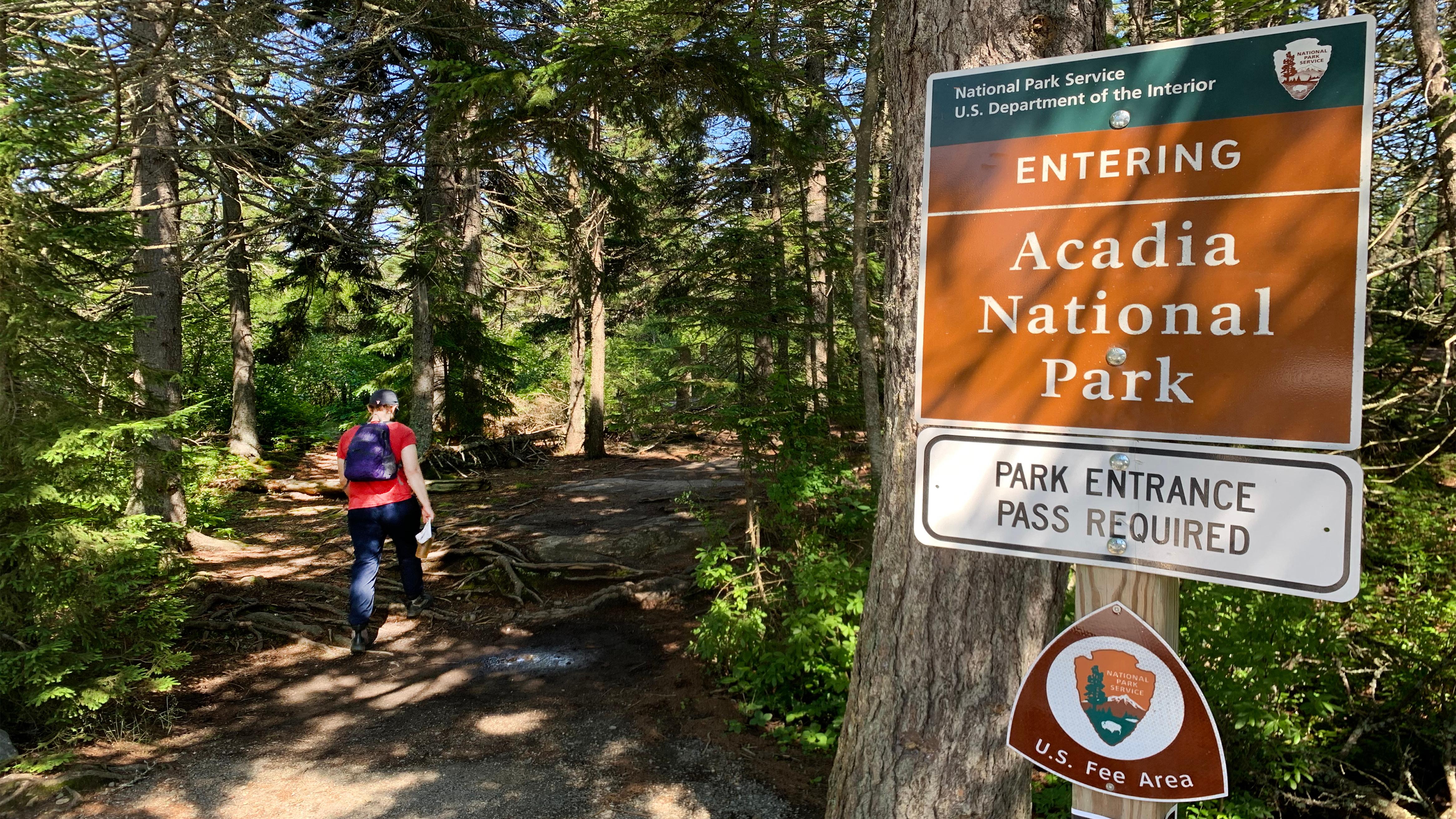
Dogs are welcome on the free Island Explorer shuttle buses, making getting around with your furry friend a breeze. While exploring Bar Harbor, consider checking out Sniffspot's listings for dog parks and other dog-friendly locations near you. Note that winter access for dogs is limited in Acadia.
Dog-friendly Congaree National Park in South Carolina
Congaree National Park in South Carolina, with the largest intact expanse of old growth bottomland hardwood forest in the southeastern United States, is a pet-friendly park that welcomes all visitors. Leashed pets are allowed on trails, including the boardwalk, as well as in the campgrounds.
This floodplain, where the Congaree and Wateree Rivers meet, supports a diverse range of plants and animals, including national and state champion trees. To fully experience the ecosystem and observe wildlife, visitors can rent a kayak or canoe.
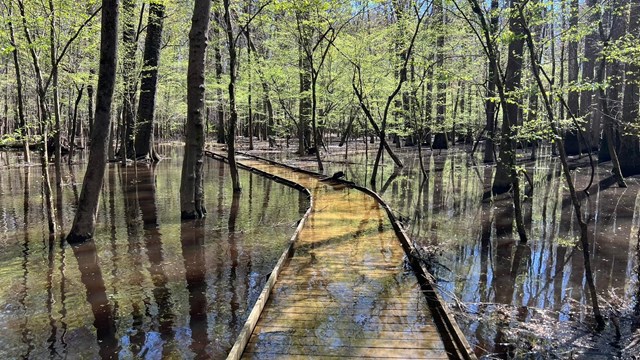
Dog-friendly Cuyahoga Valley National Park in Ohio
Cuyahoga Valley National Park, located in Cleveland, Ohio, was established in 2000 and follows the Cuyahoga River. You can bring your pup with you on all of the park’s 125 miles of trails, which traverse woodlands, wetlands, and old fields. Some trails involve stream crossings with stepping stones or log bridges, while others, such as the Ohio & Erie Canal Towpath Trail, are flat and accessible to all experience levels.
To get the best views, head to Bradford Reservation. This trail offers stunning vistas of Tinkers Creek Gorge, Ohio’s most impressive canyon, and short side trails lead to Bridal Veil Falls and the Hemlock Creek Loop Trail!
Visitors with pets should avoid the East Rim mountain-bike area and the Scenic Railroad. Be sure to check with the rangers to choose the best trail for your hiking style, and bring plenty of water for both you and your furry companion, as the dry climate and high elevation can lead to dehydration.
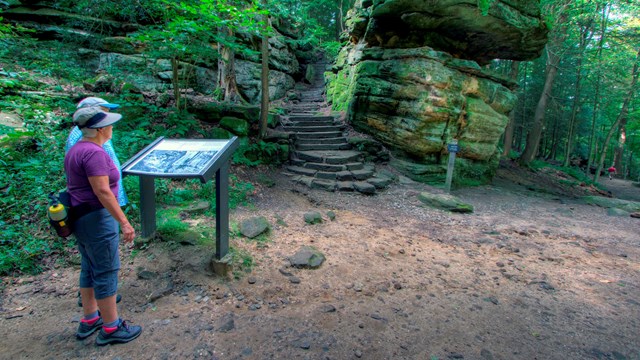
Dog-friendly Grand Canyon National Park in Arizona
The Grand Canyon, located in northern Arizona, is one of the most popular national parks that warmly welcomes dogs. You and your furry friend can enjoy a scenic walk along the entire stretch of South Rim Trail that hugs the canyon’s edge!
While the path is easy to navigate, the high altitude and arid climate can lead to dehydration, so be sure to bring plenty of water and a collapsible bowl, even if you’re only planning a short stroll.
Keep in mind that pets are not permitted on shuttle buses and are prohibited from going below the rim. However, they are welcome at Mather, Desert View, and Trailer Village Campgrounds, as well as pet-friendly rooms at the Yavapai Lodge.
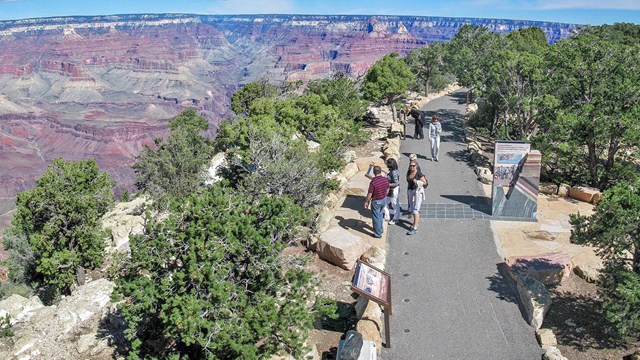
Dog-friendly Great Smoky Mountains National Park
Great Smoky Mountains National Park, spanning North Carolina and Tennessee, is a haven for outdoor enthusiasts. While dogs aren't allowed on most trails within the park, they *are* welcome on two paved paths: the Oconaluftee River Trail and the Gatlinburg Trail. The Oconaluftee River Trail offers a relaxing stroll with scenic riverside views. The Gatlinburg Trail connects the park to the town of Gatlinburg—a convenient way to explore the area with your furry friend. Remember to keep your dog leashed and pack waste bags.

Dog-friendly Great Sand Dunes National Park in Colorado
Great Sand Dunes in southern Colorado features the tallest dunes in North America, located in a diverse landscape of grasslands, wetlands, conifer and aspen forests, alpine lakes, and tundra.
Pets are permitted up to the top of the first tall ridge of dunes, located between High Dune and the Castle Creek Picnic Area, and throughout the adjoining Great Sand Dunes National Preserve. It’s important to remember that the sand can become hot, so it’s best to go early in the morning or late in the evening to protect your pup’s paws.

Dog-friendly Hot Springs National Park in Arkansas
For centuries, people have flocked to Hot Springs National Park, attracted by the steaming waters that flow from the lower west slope of Hot Springs Mountain. This unique park now protects the geothermal spring water and the historic structures of this early resort town.
Your furry friend is welcome to accompany you on a leisurely half-mile stroll down Bathhouse Row and along the Grand Promenade. If you’re up for something more challenging, you can explore the 26 miles of interconnected trails that run alongside the city or hang out at the only brewery located inside of a United States national park.

While dogs aren't allowed inside visitor centers or other park buildings, most national parks welcome them on designated trails and in outdoor areas, as long as they are leashed. Always confirm specific regulations before your visit, as some parks only allow pets in limited areas, such as parking lots and developed campgrounds. Be mindful of the high altitude and arid climate in some parks, which can lead to dehydration. Bring plenty of water and a collapsible bowl for your furry friend. For off-leash fun, explore Sniffspot's listings for private dog parks near you.
Dog-friendly Indiana Dunes National Park in Indiana
Indiana Dunes is not your typical tropical island—but its 15-mile stretch of sand can make you feel like you’re somewhere down south. This beautiful landscape was created by receding glaciers and features dunes, ponds, marshes, creeks, prairies, and forests. The area’s diverse habitats make it one of the most botanically rich national parks in America!
Leashed pets are allowed on the beaches located east of Indiana Dunes State Park, in the picnic areas, and in the campground. They are also allowed on all trails except for Glenwood Dune, Great Marsh, and Pinhook Bog.

Voted the #1 attraction in Indiana by Go Pet Friendly, Indiana Dunes National Park offers a variety of dog-friendly trails and beaches. Leashed pets are welcome on the beaches located east of Indiana Dunes State Park, as well as in picnic areas and throughout most of the park’s trails. (A few exceptions are listed on the park’s website.) This park boasts a unique landscape shaped by glaciers, featuring everything from towering dunes and tranquil ponds to lush marshes, winding creeks, expansive prairies, and serene forests. It’s also one of the most botanically diverse national parks in the US, making it a fascinating place to explore with your furry friend.
Dog-friendly Mammoth Cave National Park in Kentucky
Mammoth Cave National Park is known primarily for its vast underground passageways spanning 336 miles—but it also offers over 70 miles of trails, making it a surprisingly pet-friendly destination.
There are various short trails around the Visitors Center, and the Green River Bluffs Trail is worth exploring as it passes through a hardwood forest and culminates in a scenic overlook of the Green River. For those seeking a more extended hike, the North Side Trails present several options that pass by waterfalls and cut through one of the few remaining old-growth forests in Kentucky.
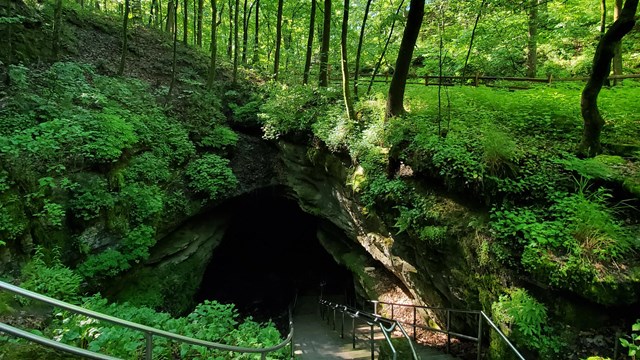
Dog-friendly New River Gorge National Park, West Virginia
New River Gorge National Park and Preserve in southern West Virginia boasts one of the oldest rivers on the continent—a rough and tumbling white water river that flows through deep canyons. The park spans over 70,000 acres of land along the water’s path between the towns of Hinton and Fayetteville. It offers guests a plethora of scenic and recreational opportunities!
All trails in the park, including the breathtaking Endless Wall Trail with its gorge vistas and the Grandview Rim Trail, are open to pets. Visitors with dogs can also take in the beauty of Sandstone and Brooks Falls.

Explore the scenic trails and overlooks with your dog at New River Gorge National Park, where all trails—including the breathtaking Endless Wall Trail and Grandview Rim Trail—are open to pets. Leashed pups are also welcome to visit Sandstone and Brooks Falls. After a day of adventure, head to the nearby town of Fayetteville, which offers a variety of dog-friendly restaurants and shops.
Dog-friendly Petrified Forest National Park in Arizona
Petrified Forest National Park, located in eastern Arizona and named after its deposits of petrified wood, is an awe-inspiring sight. From the vibrant badlands to the northern border that stretches into the Painted Desert, it’s worthy of its national park status!
Visitors can bring their dogs on a leash to explore all of the park’s trails, roads, and official wilderness areas. Be sure to keep your pup under control and within trail boundaries to protect the environment.
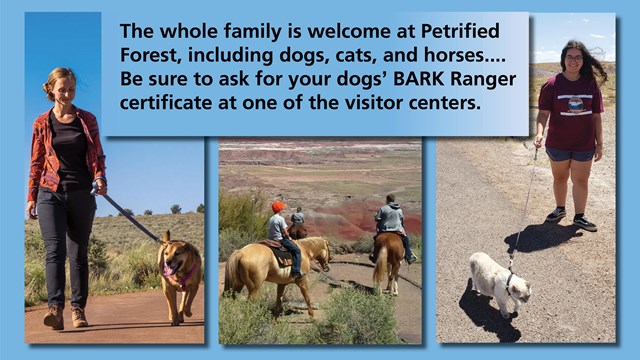
Dog-friendly Shenandoah National Park in Virginia
While Skyline Drive may be the most renowned attraction at Shenandoah National Park in Virginia, you won’t want to miss the opportunity to stop the car and go for a hike!
With over 500 miles of trails in the park, including the pet-friendly Appalachian Trail, Shenandoah is an incredible walking destination. Dogs are only restricted from accessing about 20 miles due to challenging passages or rock climbs.
Plus pets are allowed in all campgrounds, pullouts, and picnic areas, allowing them to join you in experiencing the stunning views.

Shenandoah National Park offers a variety of dog-friendly trails and even pet-friendly lodging options like Big Meadows Lodge. Its proximity to East Coast cities makes it a convenient getaway for you and your pup.
Tips for Hiking With Your Dog at Shenandoah National Park
Shenandoah National Park is a beautiful and dog-friendly destination, but it's important to be prepared for a safe and enjoyable visit with your furry friend. Here are some tips to keep in mind:
- Leash up: Keep your dog on a leash no longer than six feet at all times. This protects both your pet and the park's wildlife. A six-foot leash is the maximum allowed length.
- Pack water: Bring plenty of water for your dog, especially during warmer months. Dehydration can be a risk, and water sources may not always be readily available. Hydration is key for both you and your pup.
- Respect wildlife: Keep a close eye on your dog and prevent them from approaching or disturbing any wildlife you encounter. Shenandoah is home to various animals, and it's crucial to respect their space. Learn about Shenandoah's wildlife before your visit.
- Trail etiquette: Yield to other hikers, and be mindful of noise levels. Not everyone appreciates a barking dog, so encourage quiet enjoyment of the trails. Trail etiquette makes for a better experience for everyone.
- Check for ticks: After your hike, thoroughly check your dog for ticks. Shenandoah is a natural environment, and ticks can be present. Prompt removal is important for your dog's health. The CDC offers guidance on tick removal.
By following these tips, you can ensure a positive experience for yourself, your dog, and fellow park visitors. Remember to check the park's official website for the most up-to-date information on pet regulations and trail conditions before your visit.
Dog-friendly White Sands National Park in New Mexico
White Sands is not actually made of sand but of gypsum—which makes it one of the most remarkable dog-friendly national parks in the US. With its vast gypsum dune field covering an area of 275 square miles, White Sands is the largest such area in the world.
Visitors can bring their pets to explore the entire park, which offers nine miles of trails to discover. White Sands National Park allows dogs to explore the stunning dunes either on or off the trails while on a leash! The Playa Trail, Dune Life Nature Trail, and Interdune Boardwalk all offer intriguing exhibits about the park’s geography, as well as its diverse plant and animal life.

Dogs are welcome to explore the otherworldly landscape of White Sands—except for the visitor center. Remember that even though the dunes look cool and inviting, the gypsum can get incredibly hot, especially during summer. Consider dog booties to protect your pup’s paws, or plan your visit for cooler times of day. The park’s website has more tips on visiting with your furry friend.
Dog-Friendly Tips for National Park Adventures
Respect Wildlife and Other Visitors
Your leashed dog can join you on an adventure in many national parks, but it’s important to be respectful of the park's natural environment and other visitors. Keep your dog on a leash at all times, even if they are generally well-behaved off-leash. This helps protect your dog from dangerous wildlife like bears and other potential hazards. A leash also safeguards the park’s sensitive terrain and endangered wildlife. Be mindful of other visitors and avoid disturbing the peace and quiet of the natural environment. Not everyone is a dog person, and even those who are will appreciate your consideration.
Pack Essentials for Your Dog
Just like you pack for yourself, make sure you have everything your dog needs for a comfortable and safe trip. This includes fresh drinking water, food, bowls, waste bags, a leash, and any necessary medications. Some national parks offer water fountains, but it’s always a good idea to bring your own water, especially for longer hikes. A dog first-aid kit is also a smart addition, just in case of minor injuries on the trail.
Be Aware of Potential Dangers
National parks are full of natural wonders, but they also present potential dangers for our furry friends. Unleashed dogs can encounter dangerous wildlife or fall prey to other hazards like steep cliffs or fast-moving water. Always keep your dog on a leash and be aware of your surroundings. Check the trail conditions before you head out and be prepared for changes in weather. Familiarize yourself with the park's specific regulations for dogs before your visit.
Winter Considerations for National Parks
If you're planning a winter trip to a national park with your dog, be prepared for cold, snowy conditions, especially at higher elevations. Expect snow and cold temperatures between December and February. Many parks have additional restrictions during winter, so check specific park regulations before your visit. Pack warm layers for both you and your dog, and consider booties to protect their paws from the cold and ice. Be aware that some trails may be closed during the winter months.
Why Some Parks Restrict Dogs
While many national parks welcome dogs, some have restrictions to protect vulnerable wildlife. For example, Joshua Tree National Park restricts dogs in certain areas to protect bighorn sheep. These regulations help preserve the park's delicate ecosystem. Respect these regulations and choose dog-friendly trails and areas within the park. By following the rules, you're helping to keep these beautiful spaces open for everyone, including our four-legged friends.
FAQ About Dog Friendly National Parks in the United States
Why do so many national parks have pet restrictions?
Many national parks have pet restrictions in place primarily to protect the natural environment, sensitive terrain, endangered wildlife, and other visitors. Pets can potentially cause harm to the delicate ecosystems of national parks by disturbing native animals, trampling vegetation, and introducing non-native species.
Additionally, some visitors may be uncomfortable or even fearful around dogs, which can impact their enjoyment and safety while visiting the park.
What national park areas are dogs usually allowed in?
While pet policies can vary among national parks, in general, dogs are usually permitted in the following areas:
- Campgrounds: Dogs are often allowed in campgrounds. They must be kept on a leash at all times.
- Parking lots and paved areas: Many national parks allow dogs in paved areas, such as parking lots and picnic spots.
- Roads and highways: Dogs are generally allowed on paved roads and highways so long as they are leashed.
It’s important to note that rules can vary between national parks. Check the specific park’s website or contact the park directly for their pet policy when in doubt!
Can service dogs visit national parks?
Yes, service dogs are allowed to visit national parks with their handlers! Service animals are permitted in all areas of national parks where the public is allowed—including hiking trails, visitor centers, and other public areas, even if pets are not typically allowed in those areas. (Know that some particularly strenuous trails might be impassable for a dog, though, like those that use ladders to climb rock faces, even if service dogs are technically allowed.)
Under the Americans with Disabilities Act (ADA), service animals are dogs that are individually trained to do work or perform tasks for people with disabilities.
It’s important to note that emotional support animals, therapy animals, and other types of animals that provide comfort or companionship are not considered service animals under the ADA. Additionally, service dogs must be under the control of their handler at all times. Handlers are always responsible for cleaning up after them.
How can I make my dog a BARK ranger?
BARK Ranger is a program created by the National Park Service to encourage responsible pet ownership and promote awareness of pet rules and regulations in national parks.
Here’s how you can make your dog a BARK ranger:
- Follow park rules: Make sure to follow all park rules regarding pets, including keeping your dog on a leash and picking up after them.
- Respect wildlife: Keep your dog away from wildlife and do not allow them to chase or harass any animals.
- Learn about the park: Familiarize yourself with the park’s pet policies and regulations before you visit.
- Take the BARK Ranger pledge: Visit the National Park Service’s BARK Ranger website and take the pledge to ensure that you and your dog will follow the rules and be responsible visitors to national parks.
Additional Resources for Dog Owners
For more information on dog parks, training, enrichment activities, and even popular dog names, visit Sniffspot.com. You can also find listings for dog-friendly spots near you, including unique options like dog water parks and indoor play areas. Looking for name inspiration for your new pup? Check out our dog names resource. We also have a list of top dog trainers across the United States.
Planning a trip to a national park with your dog? The National Park Service website offers comprehensive information on pet policies and how to prepare for your visit. The NPS also promotes responsible pet ownership through programs like BARK Ranger, which encourages owners to follow park regulations and respect wildlife.
Most recent articles

Small Dog Park Guide: Tips for Finding the Perfect Spot
Finding the perfect dog park for your small breed can be tricky. Big dog parks can be overwhelming, even dangerous, for little pups. This guide helps you find the best small dog park for your little companion. We'll cover essential safety checklists and share recommendations for small dog parks across the US, including public and private options. We'll also discuss why a dedicated small dog park makes all the difference.

The Best Dog Beaches in the United States
Discovering a beach where dogs are welcome can be a delightful experience for your furry friend — nothing beats the joy of running, swimming, and playing in the sand. To make it easier for you and your pup, we’ve compiled a list of some of the best dog-friendly beaches in the United States.

Dog Hiking Guide: Trails, Safety & Training Tips
Want to explore the best dog hiking trails with your furry friend? Whether you're looking for a leisurely stroll or an adventurous trek, finding dog-friendly hiking trails can be a blast. This guide covers everything you need for a safe and fun outing, from essential gear to trail etiquette. Let's find the perfect hike for you and your pup!

Dirty Dog Syndrome: Causes, Solutions, and Prevention
It's a cringe-worthy moment every dog owner dreads: your furry friend chowing down on something truly disgusting. If your dog has a penchant for poop, you're dealing with coprophagia. It's more common than you think, and thankfully, often manageable. This article explores the reasons behind dirty dog syndrome, from instinct to learned behavior. We'll also give you practical tips to help break this unpleasant habit.

Dog Enrichment Activities: The Ultimate Guide
Ever feel like your dog is restless or bored? They may be getting enough exercise, but still need more. That's where enrichment activities for dogs come in. Giving your dog opportunities to sniff, explore, and problem-solve can make a world of difference. Whether you have a puppy, adult, or senior dog, enriching their environment is key for their well-being. Let's explore how to add cognitive enrichment for dogs, even tailoring activities to your dog's breed with breed specific enrichment and fun enrichment games for dogs.

Labrador Retriever: Ultimate Guide by Owners
Discover the Labrador Retriever, a breed celebrated for its playful nature, affectionate temperament, and trainability. Labradors are known for their friendly demeanor and adaptability, making them perfect family companions and versatile working dogs. As one of the most popular types of retrievers, Labs are ideal companions for various lifestyles and are recognized by the American Kennel Club (AKC) as an excellent breed for families.
Related articles
Top dog guides per area
Dog training guides

Dog Food Aggression: Why You Shouldn't Punish It
Does your dog ever growl when you walk by their food dish? Maybe they get possessive of treats, carrying them far away and giving you side-eye when you start to approach — or snarling at your other pets or children if they get too close.

The Ultimate Guide to Scent Training for Dogs
Your dog's nose is an amazing tool. Did you know they have 40 times the olfactory receptors than humans? Scent training for dogs taps into this superpower, turning everyday moments into exciting sniff-fests. It's enriching for all types of dogs – reactive, shy, or simply adventurous. Ready to explore the world of scent work for dogs? Let's get started.

Service Dog Training Costs: DIY vs. Pro
More than 80 million Americans rely on their service dogs to help them navigate the world. Task-trained assistance animals perform a huge range of life-changing—in many cases, life-saving—services: These dogs act as eyes for visually impaired handlers, provide mobility support, alert to seizures and blood sugar crashes, interrupt anxiety attacks, remind their people to take medications, and so much more.

How to Deal With Puppy Potty Training Regression
You thought those dreaded middle-of-the-night potty breaks were over. You were finally free from cleaning up puppy puddles. Then, suddenly, your furry friend starts having accidents again. It's frustrating, right? This puppy potty training regression is more common than you think. Don't worry; we'll help you get your pup back on track. We'll cover the common causes, offer practical solutions, and give you actionable steps to tackle this challenge together.

Dirty Dog Syndrome: Causes, Solutions, and Prevention
It's a cringe-worthy moment every dog owner dreads: your furry friend chowing down on something truly disgusting. If your dog has a penchant for poop, you're dealing with coprophagia. It's more common than you think, and thankfully, often manageable. This article explores the reasons behind dirty dog syndrome, from instinct to learned behavior. We'll also give you practical tips to help break this unpleasant habit.

How to Train Your Rescue Dog: A Complete Guide
* All Sniffspot articles are reviewed by certified trainers for quality, please see bottom of article for details *
Dog enrichment guides

Dog Hiking Guide: Trails, Safety & Training Tips
Want to explore the best dog hiking trails with your furry friend? Whether you're looking for a leisurely stroll or an adventurous trek, finding dog-friendly hiking trails can be a blast. This guide covers everything you need for a safe and fun outing, from essential gear to trail etiquette. Let's find the perfect hike for you and your pup!

Top 10 Dog Water Parks in the US
Do you have a water-loving dog looking to burn some energy? There are countless dog parks to visit throughout our country — but some of them become far too hot in the midday sun to be safe for your pets to play. That’s why we’ve put together a list of some of the best dog water parks throughout the United States! At these locations, your pup can frolic, splash, and swim to their heart’s content.

Best Toys for Herding Dogs: Keeping Your Pup Happy & Engaged
Herding dogs are amazing, intelligent companions. But that also means they need more than just a simple game of fetch. Finding the right toys for herding dogs is key to keeping them happy and stimulated. This article explores some of the best toys for herding dogs, including options specifically for breeds like Border Collies and Australian Shepherds. We'll help you discover the perfect herding toys for dogs to tap into their natural instincts and keep them entertained for hours.

Tough Dog Toys for Aggressive Chewers: A Practical Guide
Does your dog destroy every toy you give them? Is your house littered with the remnants of plush toys? Are you tired of wasting money on "indestructible" dog toys for aggressive chewers that don't last? Then this post is for you. We'll cover everything you need to know about finding the best dog toys for aggressive chewers, so you can finally give your pup something safe, durable, and fun.

Daily Exercise Calculator: How Much Exercise Does Your Dog Need?
Everyone knows dogs need exercise, but how much is enough? Walks are great, but creating a truly balanced fitness plan means understanding your dog's specific needs. This post helps you develop a daily exercise calculator for your dog, considering breed, age, and lifestyle. We'll cover fun activities, understanding exercise intensity, and recognizing when your pup has had enough. Let's create a plan that keeps your dog happy and healthy!

Complete Guide To Herding With Dogs
* All Sniffspot articles are reviewed by certified trainers for quality, please see bottom of article for details *

Dog Enrichment Activities: The Ultimate Guide
Ever feel like your dog is restless or bored? They may be getting enough exercise, but still need more. That's where enrichment activities for dogs come in. Giving your dog opportunities to sniff, explore, and problem-solve can make a world of difference. Whether you have a puppy, adult, or senior dog, enriching their environment is key for their well-being. Let's explore how to add cognitive enrichment for dogs, even tailoring activities to your dog's breed with breed specific enrichment and fun enrichment games for dogs.
Dog reactivity guides

Rottweiler Aggression: Truth vs. Myth
Many dogs have gotten a bad reputation over the years for being "dangerous breeds." Rottweilers are among them. Like pit bulls and other large, blocky-headed types of dogs, these powerful and beautiful animals are often assumed to be aggressive.

What Is a Reactive Dog? A Practical Guide for Owners
Does your dog suddenly transform into a barking, lunging Tasmanian devil on walks? It's stressful for both of you. If this sounds familiar, you might have a reactive dog. Understanding what is a reactive dog is the first step to calmer walks. We'll explore the common triggers and give you actionable strategies to manage and modify this behavior. Let's turn those stressful walks into enjoyable outings.

How to Socialize a Reactive Dog: A Step-by-Step Guide
Does your dog display reactivity to other pets or people? Maybe they’re a new rescue pup and are still settling into your home. Or they were sick growing up, so you missed their critical socialization period. Possibly they’ve had a bad experience after being raised as a normal puppy.

What Is a Reactive Dog? A Complete Guide
Is your dog overly excited or fearful around other dogs? Do they bark, lunge, or whine? You might have a reactive dog. Many dog owners face this challenge. Understanding what a reactive dog is is the first step to helping them. This guide explores the common causes of dog reactivity, explains what makes a dog reactive, and offers practical tips and resources. Let's work together to build a stronger bond with your dog and enjoy stress-free walks.

Best Online Dog Training for Reactive Dogs: A Practical Guide
Does your dog's reactivity make walks stressful? You're not alone. Many dog owners face similar challenges. This guide offers practical advice and support for managing reactivity, including finding the best online dog training for reactive dogs. We'll connect you with reactive dog support groups, share training tips, and explore resources like the best dog training app for reactive dogs. Let's build a stronger bond with your dog, together.
* All Sniffspot articles are reviewed by certified trainers for quality, please see bottom of article for details *
How To Groom a Reactive Dog
* All Sniffspot articles are reviewed by certified trainers for quality, please see bottom of article for details *
Sniffspot community guides

The State of Public Dog Parks Across the United States
From 2009 to 2020, there was a 40 percent increase in the development of public dog parks. Designated spots for canine exercise have become commonplace in every major city in North America — many pet owners won’t even consider renting an apartment that doesn’t have its own fenced-in pet area for their canine companions.

How This Family is Affording Their Dream Property Through Renting it Hourly to Dogs
Thousand Oaks, California has been a safe haven for Sniffspot host, Jen, since childhood. Having grown up in busy Santa Barbara, Jen, an introvert from an early age, would seek out solitude and serenity away from tourists attractions and droves of people visiting from elsewhere. “My grandparents own 60 acres about a 30 minute drive from here, and I grew up spending every summer and every holiday visiting them on the ranch,” Jen explained. “In Santa Barbara, we wouldn't go to the beach on the weekend because that's where everybody was, so you'd find places off the beaten path where the tourists weren't. For me, the ranch was just my happy place.”

Host Tips: Ellen K. What Makes Sniffspot Successful for Me
Ellen is the host of Country Pasture Getaway, one of Sniffspot's most popular sniff spots. She has taken the time to write up the lessons she has learned about how to be a great sniff spot host.

How this Oregon Farmer is Making a Business From Renting Her Land to Dogs
Just 20 minutes outside of the busy city of Portland, Oregon, and settled right on the banks of the Columbia River, you’ll find what countless visitors have flocked to the area in search of – mountain views, crisp, clean air, and running water for miles. What you might not expect to find, however, is a hidden oasis designed just for dogs and their people, owned and operated by a farming couple and enjoyed by visitors on two legs, and four.

Host Tips: Fran T. Providing Great Guest Service at our Spot
Fran is the host of Ranch Setting, one of Sniffspot's most popular spots. She has taken the time to write up the lessons she has learned about how to be a great Sniffspot host.

How Sniffspot Helped a Nervous Rescue Work Through His Fears and Change His Family’s Life
This is the story of a family and dog rescuing each other.
Top dog trainers in the US
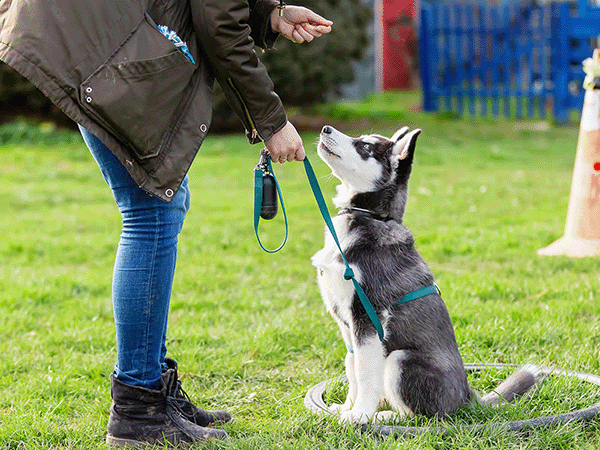
The Best Dog Trainers in the United States of 2025
This is a list of the top dog trainers in the United States, based on votes from the Sniffspot community and the general public.
The Best Dog Trainers in Seattle, WA of 2025
This is a list of the top dog trainers in Seattle, WA, based on votes from the Sniffspot community and the general public.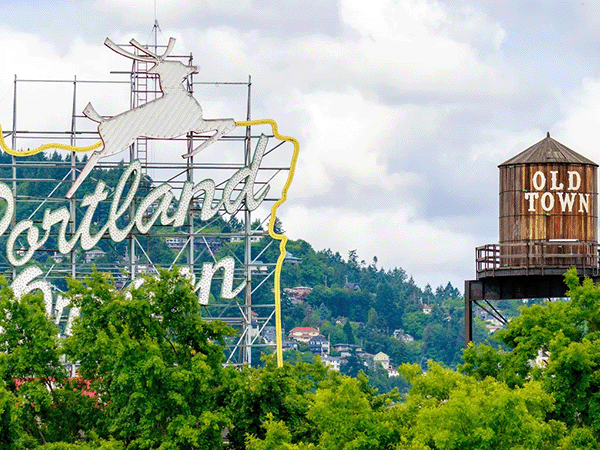
The Best Dog Trainers in Portland, OR of 2025
This is a list of the top dog trainers in Portland, OR, based on votes from the Sniffspot community and the general public.
The Best Dog Trainers in Los Angeles, CA of 2025
This is a list of the top dog trainers in Los Angeles, CA, based on votes from the Sniffspot community and the general public.
The Best Dog Trainers in New York, NY of 2025
This is a list of the top dog trainers in New York, NY, based on votes from the Sniffspot community and the general public.
City dog parks guides

Top 10 Indoor Dog Parks: A US Guide
Looking for a space to play with your dog no matter what the weather’s like outside? Look no further than our list of the best indoor dog parks in the United States! These climate-controlled spaces are growing in popularity as pet ownership increases throughout the country. As a bonus, many of them also offer dog training, boarding, grooming, or daycare services on the premises.

The Best Dog Beaches in the United States
Discovering a beach where dogs are welcome can be a delightful experience for your furry friend — nothing beats the joy of running, swimming, and playing in the sand. To make it easier for you and your pup, we’ve compiled a list of some of the best dog-friendly beaches in the United States.

15 Best Dog Parks in the US: Public & Private
Searching for the best off-leash dog parks near you in the United States? Whether you're looking for public dog parks with open spaces or private, fully-fenced areas, this comprehensive guide has you covered. Discover top-rated parks across the country, plus essential tips on what to bring and what to expect for your next adventure.

Dog Parks Near Me: Las Vegas Edition
Looking for the perfect dog park near me in Las Vegas? You're in luck! This guide explores all the best options for your pup, from public dog parks to private dog parks near me on Sniffspot. We'll help you find the ideal spot for playtime, socializing, and fresh air. Plus, we'll cover essential etiquette and safety tips to ensure a happy visit for everyone. Get ready for some tail-wagging fun!

Top Sniffspot Locations: Find the Perfect Dog Park
Looking for the perfect dog park? Whether you need a wide-open public space or a private, fenced-in spot, this guide will help you find the best dog parks across the US. We'll cover top-rated public parks, the perks of private dog parks, and even explore Sniffspot locations – giving your pup a safe and fun place to play. Ready to find your dog's new favorite spot? Let's go!

Sniffspot: Portland's Best Private Dog Parks
Ready to discover Portland's best dog parks? Whether you're looking for a public park or the unique experience of a private Sniffspot, this guide has you covered. We'll help you find the perfect spot for your pup, with tips on what to bring, how to prepare, and even understanding dog body language. Plus, we'll explore some top Portland dog parks, including public and Sniffspot options, so you can plan your next dog-friendly adventure in the City of Roses.

Small Dog Park Guide: Tips for Finding the Perfect Spot
Finding the perfect dog park for your small breed can be tricky. Big dog parks can be overwhelming, even dangerous, for little pups. This guide helps you find the best small dog park for your little companion. We'll cover essential safety checklists and share recommendations for small dog parks across the US, including public and private options. We'll also discuss why a dedicated small dog park makes all the difference.
Dogs breeds

German Shepherd Dogs: Insights From Real Dog Owners
The German Shepherd Dog (GSDs) are known for their intelligence, loyalty, and striking appearance. They're also incredibly versatile, excelling as working dogs and devoted family companions. This guide covers everything you need to know about GSDs, from understanding their unique traits and rich history to practical advice on training and care. So, whether you're a seasoned GSD owner or just starting your research, let's explore this remarkable breed together.

Labrador Retriever: Ultimate Guide by Owners
Discover the Labrador Retriever, a breed celebrated for its playful nature, affectionate temperament, and trainability. Labradors are known for their friendly demeanor and adaptability, making them perfect family companions and versatile working dogs. As one of the most popular types of retrievers, Labs are ideal companions for various lifestyles and are recognized by the American Kennel Club (AKC) as an excellent breed for families.

Golden Retriever Advice: The Complete Owner's Guide
Golden Retrievers: they're gorgeous, playful, and incredibly popular. But before you welcome one into your home, you need the right golden retriever advice. This guide draws on the wisdom of nearly 10,000 Golden Retriever owners, offering practical tips for caring for these affectionate dogs. From understanding their high energy levels to mastering grooming and training, we'll cover everything you need to know. So whether you're already a devoted Golden parent or just starting your research, get ready to learn how to give your furry friend the best possible care.

American Staffordshire Terrier: Your Complete Guide
Think American Staffordshire Terriers are tough? Think again. While their muscular build might intimidate some, these dogs are known for their playful and loyal personalities. This guide draws on the experience of nearly 10,000 AmStaff owners to reveal the truth about this often misunderstood breed. Want to learn more about caring for an American Staffordshire Terrier? You're in the right place.

Australian Shepherd Facts: Breed Info & Care Guide
Discover the Australian Shepherd, an AKC breed celebrated for its trainable, playful, and affectionate nature. Despite its name, the Australian Shepherd is actually a native breed to the United States, originally developed to breed on farms and ranches. Considered a medium dog, Australian Shepherds were bred for herding beginning in the 1950s. As one of the high-energy breeds, Aussies are known for their boundless energy and need for regular exercise, including aerobic exercise.

Essential Husky Facts for Owners: Breed Guide
Discover the Siberian Husky, a breed celebrated for its curious, intelligent, and loyal nature. Considered a medium-sized dog, Siberian Huskies were originally bred in Russia for sledding, beginning in the early 20th Century. Today, they're one of the most popular active breeds in North America.










